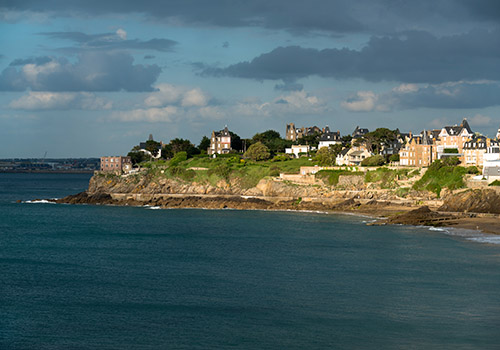Beach erosion affects almost a quarter of French coastal areas such as Normandy, the Basque Country, Brittany and Aquitaine. On average approximately one meter of these coasts is eaten away each year. This natural phenomenon also affects certain Mediterranean beaches and results inter alia from the rise of the ocean level, the change in storm patterns, the disappearance of plant life which stabilises the dunes or backshore as well as the decrease in terrigenous input of sand further to the construction of many dams in the river basins. This erosion must be taken into account when developing coastal areas where population increases at a more rapid rate than in other parts of the country.

Predicting coastal erosion
At the LEGI, a team is developing numerical models to simulate coastal erosion. “Our goal is to predict coastal erosion and its dynamics based on the weather, primarily the storm-related swell waves”, explained Eric Barthélémy, Professor at Grenoble INP – Ense3 and researcher at the LEGI. To achieve this, the scientists use the laboratory’s wave flume by comparing experimental results with the numerical models. “The wave flume is a 36 metre long, 1.3 metre deep and 55 centimetre wide glass channel. It is fitted with a piston rod knocker at one end that is moved by a hydraulic actuator and which is used to generate solitary waves, waves with regular or random frequency and amplitude and to thereby reproduce the swell motion.” The tests performed on this instrument provide a better understanding of sediment dynamics, i.e. how the sand is moved or carried and so forth.
Similarly, the sediment transport process in rivers and streams can be studied. “Julien Chauchat, a researcher at the laboratory, is developing a “diphasic” model that contrasts with the traditional approach which involves treating the moving solid phase (sediments) and the carrying fluid separately, states Eric Barthélémy. However, this is difficult to set up in terms of predicting the trends at the scale of a river”.
Moreover, researchers at the LEGI are involved in the WATU project funded by the ERC* and spearheaded by Nicolas Mordant, from the Joseph Fourier University and a member of the LEGI. This project will focus on the study of the statistical properties of the wave turbulence whose applications also relate to understanding oceanic wave climate properties. More to follow…
* European Research Council

Predicting coastal erosion
At the LEGI, a team is developing numerical models to simulate coastal erosion. “Our goal is to predict coastal erosion and its dynamics based on the weather, primarily the storm-related swell waves”, explained Eric Barthélémy, Professor at Grenoble INP – Ense3 and researcher at the LEGI. To achieve this, the scientists use the laboratory’s wave flume by comparing experimental results with the numerical models. “The wave flume is a 36 metre long, 1.3 metre deep and 55 centimetre wide glass channel. It is fitted with a piston rod knocker at one end that is moved by a hydraulic actuator and which is used to generate solitary waves, waves with regular or random frequency and amplitude and to thereby reproduce the swell motion.” The tests performed on this instrument provide a better understanding of sediment dynamics, i.e. how the sand is moved or carried and so forth.
Similarly, the sediment transport process in rivers and streams can be studied. “Julien Chauchat, a researcher at the laboratory, is developing a “diphasic” model that contrasts with the traditional approach which involves treating the moving solid phase (sediments) and the carrying fluid separately, states Eric Barthélémy. However, this is difficult to set up in terms of predicting the trends at the scale of a river”.
Moreover, researchers at the LEGI are involved in the WATU project funded by the ERC* and spearheaded by Nicolas Mordant, from the Joseph Fourier University and a member of the LEGI. This project will focus on the study of the statistical properties of the wave turbulence whose applications also relate to understanding oceanic wave climate properties. More to follow…
* European Research Council
SUMMARY
- Grenoble, high potential natural and technological risk management
- Dealing with natural and technological risks
- Falling boulders and snow
- An earthquake-prone area, vulnerable structures
- Water, the main risk factor
- Rocks: custodians of radioactive waste
- Coastal risks at the centre of LEGI research
- Several training courses including a MOOC!





